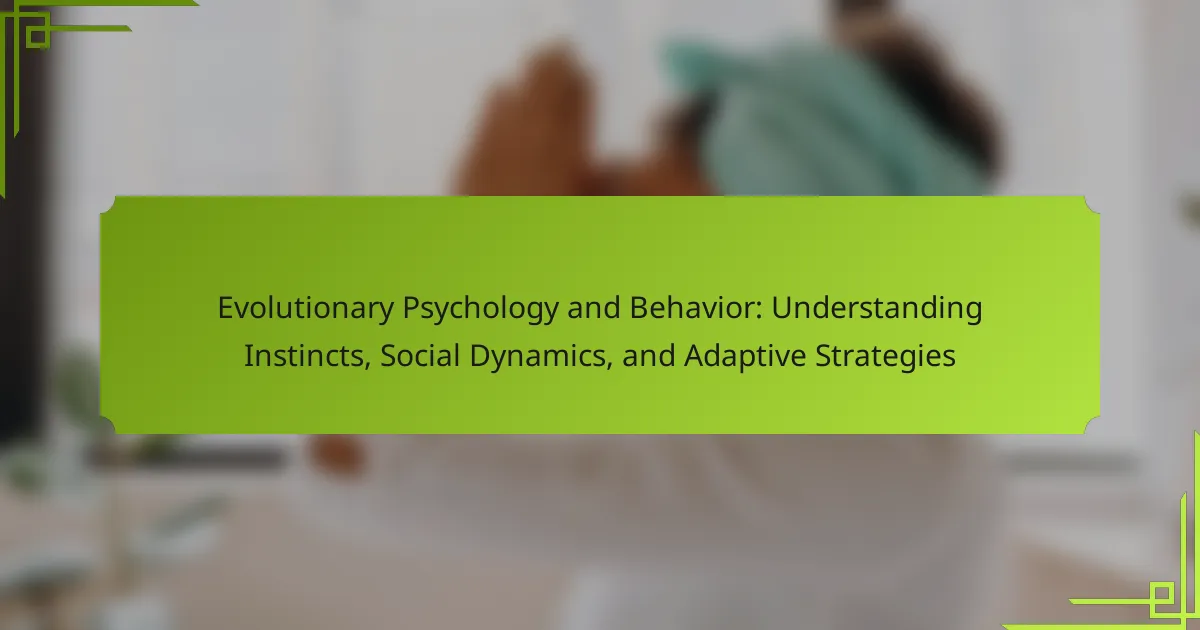Understanding the instincts and social dynamics that shape human behavior can enhance personal development and decision-making. Evolutionary psychology explores how ancestral survival mechanisms influence modern interactions. It examines key attributes like adaptability and innate responses, alongside unique social strategies such as kin selection and reciprocal altruism. Insights into aggression and emotional responses further illuminate the complexities of human behavior and relationships.

What is Evolutionary Psychology?
Evolutionary psychology examines how human behavior is shaped by evolutionary processes. It focuses on instincts, social dynamics, and adaptive strategies that have developed over time. This field suggests that many behaviors are rooted in ancestral survival mechanisms. For instance, cooperation and competition are viewed as adaptive strategies that enhance reproductive success. Understanding these dynamics provides insights into modern human interactions and psychological traits.
How does Evolutionary Psychology explain human behavior?
Evolutionary psychology explains human behavior as a product of adaptive strategies shaped by natural selection. It emphasizes instincts, social dynamics, and the evolutionary origins of psychological traits. This field suggests that many behaviors, such as cooperation and competition, arise from ancestral survival needs. Understanding these behaviors provides insights into modern human interactions and decision-making processes. Evolutionary psychology also highlights the role of environmental pressures in shaping social structures and individual behaviors, revealing the complex interplay between biology and culture.
What are the key principles of Evolutionary Psychology?
The key principles of evolutionary psychology include the understanding that human behavior is shaped by evolutionary processes. This field emphasizes instincts, social dynamics, and adaptive strategies as essential components of human psychology. It posits that many psychological traits are adaptations to ancestral environments, influencing modern behavior. These principles help explain phenomena such as mate selection, altruism, and aggression, highlighting the role of natural selection in shaping human instincts and social interactions.

What are the universal attributes of instincts in Evolutionary Psychology?
Instincts in Evolutionary Psychology share universal attributes that drive behavior and social dynamics. These attributes include adaptability, survival mechanisms, and innate responses to environmental stimuli.
Adaptability allows individuals to modify behaviors based on changing circumstances, enhancing survival prospects. Survival mechanisms encompass inherent behaviors that promote reproduction and resource acquisition. Innate responses are automatic reactions to specific stimuli, ensuring quick decision-making in critical situations.
Understanding these attributes provides insight into human behavior and the evolutionary forces shaping social interactions.
How do instincts influence decision-making?
Instincts significantly influence decision-making by guiding behaviors that enhance survival and social cohesion. Evolutionary psychology suggests that these instincts, rooted in our ancestral past, shape choices in various contexts, such as mating, resource acquisition, and conflict resolution. For instance, the instinct for social bonding drives individuals to form alliances, impacting group dynamics and cooperative strategies. Additionally, unique attributes like fear responses can trigger immediate decisions to avoid danger, illustrating the adaptive nature of instincts in complex environments. Understanding these influences provides insight into human behavior and social interactions.
What role do instincts play in social interactions?
Instincts significantly influence social interactions by guiding behaviors essential for survival and cooperation. They promote bonding, communication, and group cohesion, enhancing adaptive strategies. For example, empathy and altruism stem from innate instincts that foster social connections, improving group dynamics. Understanding these instincts reveals how evolutionary psychology shapes our social behavior, emphasizing the role of innate drives in forming relationships and navigating social environments.

What unique attributes define social dynamics in Evolutionary Psychology?
Unique attributes defining social dynamics in evolutionary psychology include kin selection, reciprocal altruism, mating strategies, social hierarchies, and group cohesion. Kin selection emphasizes genetic relatedness in social behavior. Reciprocal altruism highlights mutual benefit in social exchanges. Mating strategies reflect adaptive behaviors to enhance reproductive success. Social hierarchies influence resource distribution and power dynamics. Group cohesion fosters collaboration and survival, enhancing adaptive strategies. These attributes illustrate how evolutionary pressures shape social interactions and behaviors.
How do social hierarchies develop according to Evolutionary Psychology?
Social hierarchies develop as adaptive strategies for resource allocation and social cohesion. Evolutionary psychology posits that these hierarchies arise from innate instincts shaped by survival needs. Individuals assess social status based on traits like dominance, cooperation, and altruism, influencing group dynamics. As a result, hierarchies facilitate conflict resolution and enhance reproductive success, reinforcing social structures over generations.
What is the significance of kin selection in social behavior?
Kin selection significantly influences social behavior by promoting altruistic actions towards genetically related individuals. This evolutionary strategy enhances the survival of shared genes. For example, individuals may sacrifice personal benefits to help relatives, ensuring the continuation of their genetic lineage. Kin selection underlines the adaptive strategies that shape social dynamics, emphasizing cooperation and support within familial groups. This behavior is crucial in species where social bonds enhance reproductive success and survival rates.

What rare attributes impact adaptive strategies in human behavior?
Rare attributes significantly influence adaptive strategies in human behavior by shaping decision-making processes and social interactions. Factors such as genetic predispositions, environmental pressures, and cultural variations create unique adaptations. For instance, resilience to stress can enhance survival, while cooperative behaviors foster group cohesion. These rare traits enable individuals to navigate complex social landscapes effectively, ultimately impacting evolutionary success. Understanding these attributes provides insight into the nuances of human behavior and the development of adaptive strategies.
How do cultural factors shape adaptive strategies?
Cultural factors significantly influence adaptive strategies by shaping behavior, social norms, and resource management. These strategies evolve based on environmental pressures and cultural contexts, leading to unique adaptations. For instance, collectivist cultures may prioritize group cohesion, enhancing cooperative behaviors, while individualistic cultures may foster competition, impacting resource allocation and conflict resolution. Understanding these dynamics reveals how cultural attributes guide adaptive responses to challenges and opportunities.
What are the implications of evolutionary mismatches in modern society?
Evolutionary mismatches in modern society can lead to maladaptive behaviors and mental health issues. As humans evolved in environments vastly different from today, instincts and social dynamics may not align with contemporary challenges. For instance, our predisposition for high-calorie foods conflicts with the availability of processed options, contributing to obesity. Additionally, social media can exacerbate feelings of isolation, despite our need for social connection. Recognizing these mismatches helps in developing adaptive strategies to mitigate their effects.

How do evolutionary perspectives explain aggression?
Evolutionary perspectives explain aggression as an adaptive behavior shaped by natural selection. Aggression may enhance survival and reproduction by securing resources, deterring rivals, and protecting offspring. Studies suggest that aggressive traits can be linked to evolutionary advantages, such as increased mating opportunities and territory control. Understanding these dynamics reveals how social hierarchies and competition influence aggressive behaviors across species.
What are the evolutionary benefits of aggression?
Aggression offers several evolutionary benefits, enhancing survival and reproductive success. It aids in resource acquisition, territory defense, and social hierarchy establishment. Aggressive individuals often gain access to better mates and increased offspring viability. This behavior is adaptive, promoting gene propagation and species survival.
How does aggression manifest differently across cultures?
Aggression manifests differently across cultures due to varying social norms, values, and environmental factors. In collectivist societies, aggression may be expressed indirectly to maintain group harmony. Conversely, individualistic cultures might display direct aggression as a means of asserting personal rights. Cultural context shapes the interpretation of aggressive behavior, influencing its acceptance and expression. For instance, some cultures view assertiveness as a positive trait, while others may see it as disruptive. Understanding these cultural nuances is essential for interpreting aggression in a global context.

What insights can we gain from evolutionary psychology for personal development?
Evolutionary psychology offers insights that enhance personal development by revealing underlying instincts and social dynamics. Understanding these aspects can help individuals navigate relationships and improve decision-making.
One key insight is the recognition of adaptive strategies rooted in human evolution. For example, awareness of social hierarchies can inform how to build effective networks. Additionally, grasping the instinctual drives for survival and reproduction can guide personal motivations and goal-setting.
Moreover, evolutionary psychology emphasizes the importance of emotional responses, which can shape behavior and influence personal growth. By recognizing these patterns, individuals can develop greater emotional intelligence and resilience.
Lastly, understanding the evolutionary basis of behavior fosters self-acceptance and compassion towards others, leading to healthier interpersonal relationships and a more fulfilling life.
What are the best practices for applying evolutionary psychology to improve relationships?
To improve relationships using evolutionary psychology, focus on understanding innate behaviors and social dynamics. Recognize that attraction often stems from evolutionary instincts, such as the desire for security and partnership. Prioritize communication that acknowledges these instincts, fostering empathy and connection. Utilize adaptive strategies like shared experiences to strengthen bonds. Lastly, be aware of unique attributes in partners, such as personal values and life goals, to enhance compatibility and satisfaction.
What common mistakes should be avoided when interpreting human behavior through an evolutionary lens?
To interpret human behavior through an evolutionary lens, avoid oversimplifying complex behaviors as solely instinctual. Misinterpretation can arise from neglecting cultural influences and individual differences. Additionally, assuming that all behaviors have a clear adaptive purpose can lead to erroneous conclusions. Consider the context in which behaviors occur to avoid these pitfalls.
How can understanding instincts enhance personal well-being?
Understanding instincts can significantly enhance personal well-being by fostering self-awareness and improving decision-making. By recognizing instinctual responses, individuals can better navigate social dynamics and adapt their behaviors for positive outcomes. This awareness can lead to healthier relationships and a greater sense of fulfillment. Additionally, understanding the evolutionary basis of instincts can empower individuals to develop adaptive strategies that align with their true needs and values, promoting overall mental and emotional health.
